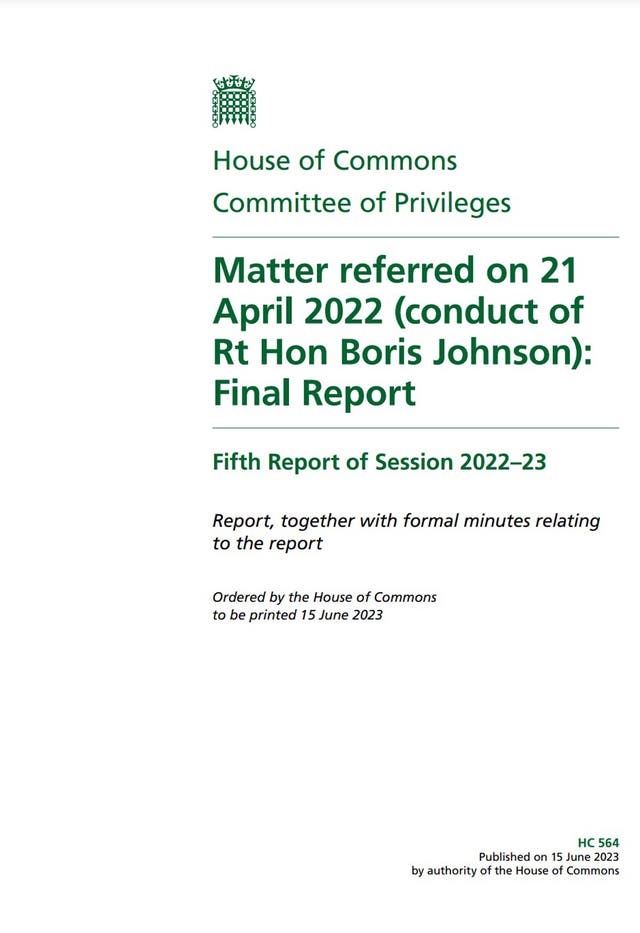Boris Johnson found to have committed ‘repeated contempts’ of Parliament
The former prime minister would have been recommended for a 90-day suspension if he had not resigned in protest over the Privilege Committee findings.

Boris Johnson committed “repeated contempts” of Parliament by deliberately misleading MPs with his partygate denials before being complicit in a campaign of abuse and intimidation, a cross-party investigation has found.
Branding him the first former prime minister to have ever lied to the Commons, the Privileges Committee said the offences merited a 90-day suspension which would have paved the way for a by-election if he had not quit in anticipation.
His resignation means he will escape that punishment but the committee recommended that he should not receive the pass granting access to Parliament which is normally given to former MPs.
The former Conservative leader called the committee “beneath contempt” and claimed its 14-month investigation had delivered “what is intended to be the final knife-thrust in a protracted political assassination”.
Now Rishi Sunak faces the bitter infighting in the Tory party again erupting on Monday when MPs will be asked to approve the report, as Downing Street said it was wrong to “traduce” the “properly constituted committee”.
The committee found Mr Johnson guilty of a “serious contempt” for “deliberately misleading” MPs by insisting all rules had been followed in Downing Street despite lockdown-breaching parties.
The MPs had provisionally agreed a suspension long enough to potentially trigger a by-election in Mr Johnson’s Uxbridge and South Ruislip constituency before he resigned in protest at the findings, attacking the committee as a “kangaroo court”.
But they said he committed further contempts by undermining the democratic processes of the Commons and being “complicit in the campaign of abuse and attempted intimidation of the committee”.

They also concluded he committed a “very serious contempt” by breaching confidentiality requirements in his resignation statement by criticising the committee’s provisional findings.
Attacking the committee’s findings, Mr Johnson said: “This is rubbish. It is a lie.
“This is a dreadful day for MPs and for democracy.”
The committee, comprised of four Tories, two Labour MPs, and one from the SNP, found many aspects of his defence were “not credible”, allowing them to conclude he “intended to mislead” MPs.
They dismissed Mr Johnson’s argument that mid-pandemic staff leaving dos were essential to maintain staff morale, noting they attracted police fines while the rules would have been clear to him.

“That belief, which he continues to assert, has no reasonable basis in the rules or on the facts.”
They criticised his persistence in arguing a “unsustainable interpretation” of the rules to argue events were permissible as being “disingenuous and a retrospective contrivance to mislead”.
The committee said his public criticism was a “cynical attempt to manipulate” the opinions of MPs and the public.
They found it highly unlikely as the “most prominent public promoter” of Covid rules that he could have “genuinely believed” his partygate denials.
The committee said his resignation last Friday means it is “impossible” for the recommended suspension to be imposed.

But the vote on the committee’s findings set for Monday by Commons Leader Penny Mordaunt presents a major challenge for the Prime Minister’s bid to soothe the bitter divides in the Tory party that have only been entrenched by his public row with Mr Johnson.
His arch-ally Nadine Dorries claimed the report had “overreached” and said that any Tory MP who votes to approve it is “fundamentally not a Conservative” and should be deselected.
Tory MPs are not expected to be whipped into taking a position in the vote that will take place on Mr Johnson’s 59th birthday – three years on from the celebration in No 10 that led to him being fined by police for breaching coronavirus laws.
Mr Johnson’s most vocal defenders will face scrutiny themselves as the Privileges Committee said it will publish a special report into attempts to undermine its work.

“That committee worked diligently, compiled their report, came with the findings, and it’s now time to accept that report and move on,” she added.
Mr Sunak’s official spokesman also defended the “properly constituted committee carrying out work at the behest of Parliament”.
“It would not be right to traduce or criticise the work of the committee,” he added.
The official brushed off a Liberal Democrats call for Mr Johnson to be stripped of the £115,000 annual allowance available to former prime ministers to run their office.
Deputy leader Daisy Cooper said: “This damning report should be the final nail in the coffin for Boris Johnson’s political career.
“Rishi Sunak must cut off Johnson’s ex-prime minister allowance to stop him milking the public purse for his own personal gain.
“Anything less would be an insult to bereaved families who suffered while Boris Johnson lied and partied.”
The committee had considered whether it should have recommended expelling Mr Johnson from the Commons.
During discussion of the report’s final findings, the SNP’s Allan Dorans and Labour’s Yvonne Fovargue backed the stronger sanction.
But the amendment was opposed by the Conservative members: Sir Charles Walker, Andy Carter, Alberto Costa and Sir Bernard Jenkin, whom Mr Johnson has urged to resign from the committee over his own alleged rule-breach.





